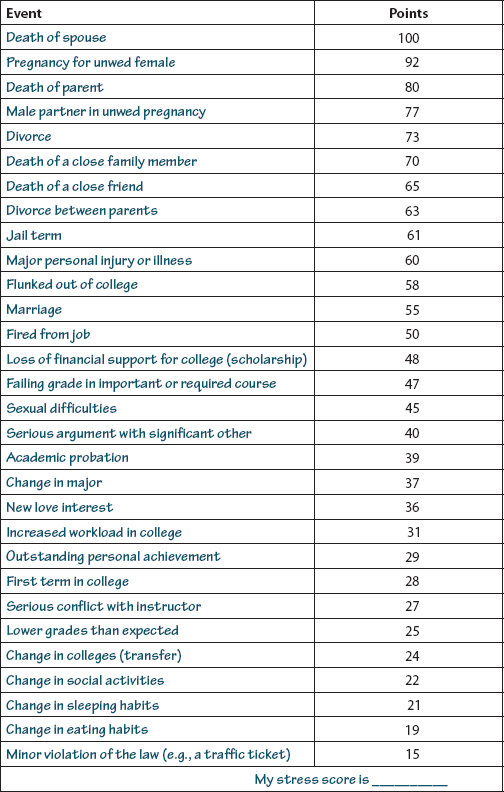Managing Stress
YOUR TURN
Write and Reflect
Are you stressed before an exam or graded performance? The next time that you are in a stressful situation, keep a written record of how you feel, both physically and mentally. What specific changes do you notice in your behavior and feelings? Reflect on the ways that stress affects your ability to concentrate, your breathing patterns, your patience, and so on.
In the spring of 2012, according to a survey conducted by the American College Health Association, about 30 percent of college students reported that stress had negatively affected either an exam grade or a course grade,1 an increase of 5 percent since a 2010 survey. When you are stressed, your body undergoes rapid physiological, behavioral, and emotional changes. Your rate of breathing can become more rapid and shallow. Your heart rate begins to speed up, and the muscles in your shoulders and forehead, at the back of your neck, and perhaps across your chest begin to tighten. Your hands might become cold or sweaty. You might experience gastrointestinal symptoms such as an upset stomach. Your mouth and lips might feel dry and hot, and you might notice that your hands and knees begin to shake or tremble. Your voice might quiver or even go up an octave.
A number of psychological changes also occur when you are under stress. You might experience changes in your ability to think, such as confusion, trouble concentrating, an inability to remember things, and poor problem solving. Emotions such as fear, anxiety, depression, irritability, anger, or frustration are common, and you might have trouble getting to sleep at night or might wake up too early and not be able to go back to sleep.
Stress has many sources, but two seem to be prominent: life events and daily hassles. Life events are those that represent major adversity, such as the death of a parent, spouse, partner, or friend. Researchers believe that an accumulation of stress from life events, especially if many events occur over a short period of time, can cause physical and mental health problems. Daily hassles are the minor irritants that we experience every day, such as losing your keys, having three tests on the same day, quarreling with your roommate, or worrying about money.
The College Readjustment Rating Scale is a life events scale, adapted from Holmes and Rahe’s Life Events Scale and modified for traditional-age college students. Although this scale was developed in the 1960s, it continues to be widely used today. Complete the scale in Figure 13.1. If your score is 150 or higher, you have experienced a great deal of stress over the past year. You might consider what help you need or skills you must learn to be able to cope effectively.
Adapted from Holmes-Rahe Social Readjustment Rating Scale. Journal of Psychosomatic Research, Vol. 11, pp. 213-218. Copyright 1967, with permission from Elsevier.

In Figure 13.1 each event, such as one’s first term in college, is assigned a value that represents the amount of readjustment that a person has to make in life as a result of change. In some studies people with serious illnesses have been found to have high scores on similar scales. People with scores of 300 and higher have a high health risk. People who score between 150 and 300 points have about a 50-50 chance of a serious health change within two years. People who score 150 and below have a one in three chance of a serious health change.
If your score is high enough to indicate potential health problems, pay special attention to the stress-reduction and management techniques discussed in this chapter and select and implement some of these strategies to reduce your stress.2
The best starting point for handling stress is to be in good physical and mental shape. When your body and mind are healthy, it’s like inoculating yourself against stress. In other words, you need to pay attention to your diet, exercise, sleep, and mental health.